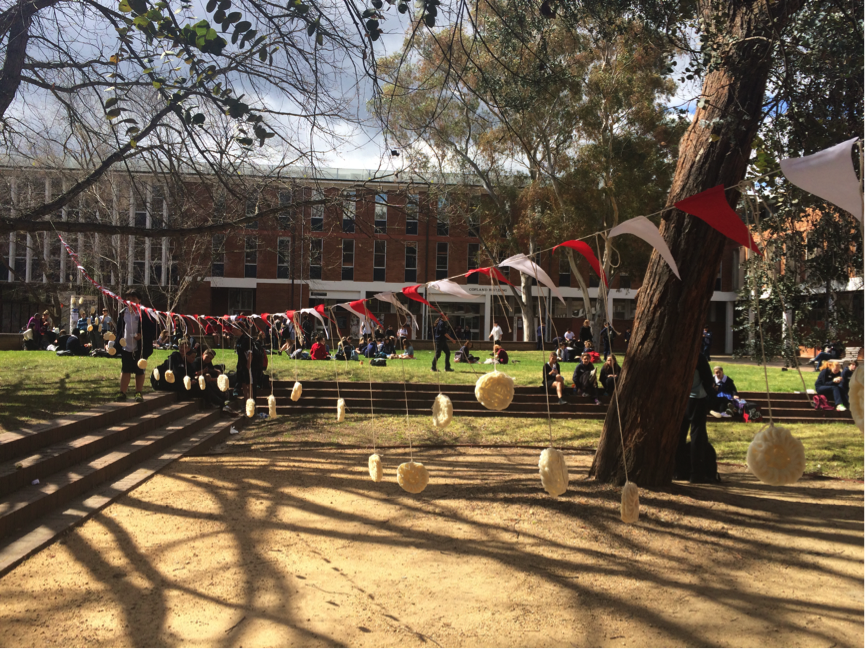Not just fun and games: AIYA ACT’s “Indonesia Day”
On Wednesday the 17th of September the AIYA ACT Chapter hosted approximately 250 students from years 7 to 12 from across the ACT. The students had an opportunity to experience Indonesian culture, language and history not offered in the classroom.
The students began the day with a breakout session of language, where students practised their introductions with students from different schools. Each student in year 7 and 8 wrote a postcard that will be sent to a school in Yogyakarta in the hope that an exchange of language and friendship can be developed between the two cities.
The year 9, 10, 11 and 12s had the opportunity to learn the Balinese Kecak dance from Mas Gede from the Indonesian Embassy.
After morning tea, the year 7 and 8s moved into workshops where they had the opportunity to learn dances from the Poco-poco to Sumatran dances, cooking, bargaining skills, negotiating skills, angklung and how to wear traditional clothes. These workshops gave students a unique opportunity to engage in a particular part of Indonesian culture and learn more about the Indonesian way. These workshops were led by PPIA ACT, the Australian Indonesian Families Association, master of all things language, Dr George Quinn and students from the ANU.
The year 9, 10, 11 and 12s spent the hour and half with Associate Professor Greg Fealy and PhD candidate Tom Power who gave a thrilling lecture on Indonesian politics and the recent Indonesian election. Students engaged deeply in a topic that would help them understand the complexity of Indonesian politics and the Australian–Indonesian relationship.

Lecture by Associate Professor Greg Fealy and PhD candidate Tom Power on Indonesian politics and the recent Indonesian presidential election
At lunchtime, students ate Indonesian snacks including martabak and perkedel. After a quick snack we got into the games with an Independence Day style celebration. First up was the Krupuk challenge where about 100 krupuk Palembang were tied to trees and students raced to finish theirs the fastest —without their hands. Students also had the opportunity to try their hand at the eggplant race popular in Java. Students tied an eggplant from their waist and raced to hit a small ball the fastest across the finish line. Many laughs were had as students struggled and fluked their way across the line.
Thanks to the kind donation from Indocafe we ran a quiz competition with questions about Indonesia and students had the opportunity to win $10 vouchers for lunch at the Indocafe.
At the closing ceremony Amrih Widodo and Zara Maxwell-Smith spoke about the opportunity to keep studying Indonesian in year 11 and 12 through the ANU and made important points about the benefits and importance of studying Indonesian.
In the ACT, there are serious fluctuations of Indonesian language students. With only one private school in Canberra teaching the language of our closest neighbour. In the three colleges (year 11 and 12) that study Indonesian: Narrabundah, Dickson and Burgmann College teachers struggle to keep numbers up: a maximum of 30 students graduate year 12 with a major in Indonesian each year. With much fewer of those students pursuing Indonesian at a university level.
Programs such as the ANU Secondary School program make it possible for students to continue studying Indonesian despite not having Indonesian at their school, but requires a large commitment from the students.
If Australia is serious about the future of the Australia–Indonesia relationship we need to ensure that students are engaging and studying Indonesian in those early years. It is important that days such as Indonesia Day continue to act as an important way to engage students on a cultural and political level so that students understand the true importance of studying Indonesian. We need to ensure that there is funding available for students to participate in events such as these.
Students also need to have access to Indonesia and visit the country. Overseas trips are important for encouraging passion and commitment to Indonesian. It also creates confidence amongst students in their language skills.
We would like to praise the teachers who spend countless hours organising high school students to come to events such as these ones and work tirelessly to encourage students to continue pursuing Indonesian. We must never underestimate the power and influence that these teachers have in the future of the relationship.
Australia has a culture of mono-lingualism and a lack of understanding of our closest neighbour. But through the expansion of our schools programs and by creating momentum behind the relationship with our most important neighbour we can improve the relationship for the future.
Indonesia day this year allowed students to gain a slightly deeper understanding about the great country that is Indonesia and the benefits of studying such an exciting and diverse language and culture. But, there is a lot more work to do before we can ensure that secondary Indonesian language studies are sustainable for the future of the relationship.
A big thanks goes out to everyone who helped us to organise, volunteer and fund the day!



